 Petzlover
Petzlover American Foxhound is originated from United States but Bearded Collie is originated from United Kingdom. American Foxhound may grow 9 cm / 4 inches higher than Bearded Collie. Both American Foxhound and Bearded Collie are having almost same weight. American Foxhound may live 3 years less than Bearded Collie. Both American Foxhound and Bearded Collie has almost same litter size. American Foxhound requires Low Maintenance. But Bearded Collie requires High Maintenance
American Foxhound is originated from United States but Bearded Collie is originated from United Kingdom. American Foxhound may grow 9 cm / 4 inches higher than Bearded Collie. Both American Foxhound and Bearded Collie are having almost same weight. American Foxhound may live 3 years less than Bearded Collie. Both American Foxhound and Bearded Collie has almost same litter size. American Foxhound requires Low Maintenance. But Bearded Collie requires High Maintenance
 As a cousin of the English Foxhound, the American Foxhound is a scent hound and bred for hunting. Robert Brooke brought the first hunting dogs to the colonies in 1650. These dogs were the starting point for several American hound breeds including the American Foxhound.
As a cousin of the English Foxhound, the American Foxhound is a scent hound and bred for hunting. Robert Brooke brought the first hunting dogs to the colonies in 1650. These dogs were the starting point for several American hound breeds including the American Foxhound.
For almost 300 years the Brooke family owned and bred dogs from this bloodline.
At the same time that Brooke was hunting with and breeding his hounds, George Washington was given French Foxhounds. These were crossed with the Brooke’s dogs to create the American Foxhound. This breed is said to have been originally bred in Virginia and Maryland.
They are the state dog of Virginia. After Red Foxes were imported or migrated, Irish Foxhounds were brought to American and added into the line, increasing the stamina and speed that today’s dog’s still display.
The American Foxhound was recognized by the American Kennel Club in 1886. Today’s American Foxhound presents in many different lines but are all considered the same breed even though some ay look very different. These strains include the Trigg, Walker, Penn-Marydel, Goodman, July and Calhoun.
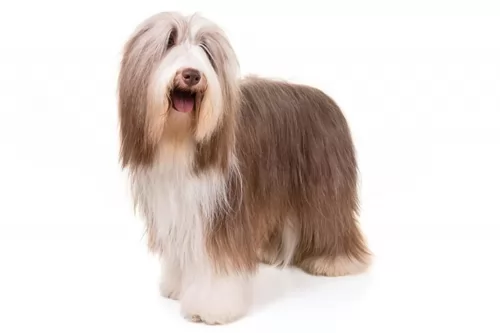 This long-haired herding breed was bred by mixing the two sheepdog breeds: the Scottish dogs and the Polish sheepdogs. The Bearded Collie gained the popularity during the last century by winning some of the Dog Shows. This friendly dog with the beautiful coat is surely one of the most specific pets. Nowadays, the Bearded Collie is very popular. The organizations for breeding, saving, rescuing and adopting this breed can be found in the USA.
This long-haired herding breed was bred by mixing the two sheepdog breeds: the Scottish dogs and the Polish sheepdogs. The Bearded Collie gained the popularity during the last century by winning some of the Dog Shows. This friendly dog with the beautiful coat is surely one of the most specific pets. Nowadays, the Bearded Collie is very popular. The organizations for breeding, saving, rescuing and adopting this breed can be found in the USA.
 Given the variety of bloodlines and strains mentioned above, there can be many differences in the American Foxhounds. Because of this most American Foxhounds bred to show are Walkers as they most closely fit the AKC Breed Standard.
Given the variety of bloodlines and strains mentioned above, there can be many differences in the American Foxhounds. Because of this most American Foxhounds bred to show are Walkers as they most closely fit the AKC Breed Standard.
In general, the American Foxhound has long, straight legs and is taller than the English Foxhound. They have a narrow chest and domed skull with a long muzzle.
They have low, wide set eyes that should be dark – brown or hazel, never blue. They have feet like a fox and laid-back shoulders with a curved tail. Athletic and muscled, the American Foxhound is bred to run. They are one of the rarest breeds in the United States.
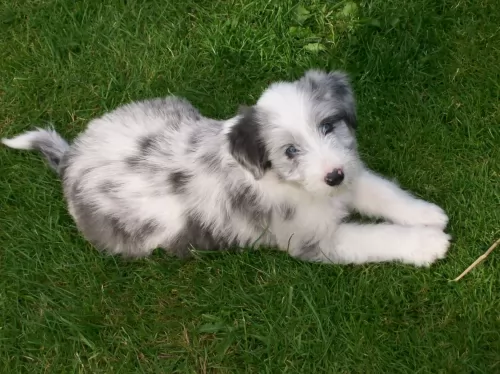 The Beardie is easy to recognize because of the longer hairs on the cheeks, chin and under the lower lip. This medium-sized Bouncing Beardie is usually the great family pet because he is very friendly and loving. This breed is extremely active and they are energetic despite their longer bodies. They grow up to have more than one coat colour, but they are all born one coloured. They always have white or cream markings. This smart dog can be very stubborn and independent, if you keep your dog in a yard, he will use every chance to escape.
The Beardie is easy to recognize because of the longer hairs on the cheeks, chin and under the lower lip. This medium-sized Bouncing Beardie is usually the great family pet because he is very friendly and loving. This breed is extremely active and they are energetic despite their longer bodies. They grow up to have more than one coat colour, but they are all born one coloured. They always have white or cream markings. This smart dog can be very stubborn and independent, if you keep your dog in a yard, he will use every chance to escape.
 With a reputation as a docile, sweet dog, the American Foxhound is great with kids and animals. They are gentle and often very shy with strangers. They are strong willed and stubborn especially when training them, so they are not a good first dog. They need an owner who has handled dogs before and knows how to be the pack leader without being angry or mean.
With a reputation as a docile, sweet dog, the American Foxhound is great with kids and animals. They are gentle and often very shy with strangers. They are strong willed and stubborn especially when training them, so they are not a good first dog. They need an owner who has handled dogs before and knows how to be the pack leader without being angry or mean.
The American Foxhound is a scent hound and once he is on the scent it is close to impossible to distract him from it. They have a tendency to ignore commands when they are in this state. A strong owner/leader is needed for this reason. Don’t let him off leash in an unfenced area.
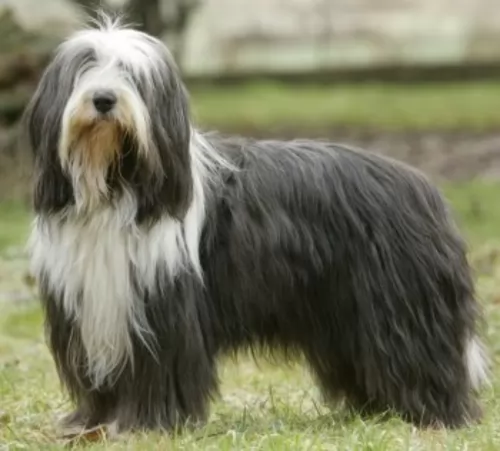 The Bouncing Beardie is great with children. They are very playful, jumpy and have generally very sweet and gentle personality. Children love them because they never get tired. If properly socialized, this dog can be the main attraction for any child.
The Bouncing Beardie is great with children. They are very playful, jumpy and have generally very sweet and gentle personality. Children love them because they never get tired. If properly socialized, this dog can be the main attraction for any child.
Herding, agility shows, obedience competitions, treibball, show dogs, trally...
This breed is very friendly. If your family is about to raise the Bearded Collie, prepare to have a pet that is highly affectionate and bonded with the members of the family. They don’t do well if left alone. They usually don’t bark and they are never destructible, but loneliness somehow triggers odd behaviour with this breed. They are not usually scared of strangers. If they are trained and socialized, you will be able to take your Beardie anywhere you go.
Some say that is very easy to train the Bearded Collie. The rule for this breed is to start the obedience training while they are very small. They are generally very independent, and they will try to do things in their own way. If you start your training early before your Beardie forms this kind of personality, you will have a wonderful pet.
 The American Foxhound, like most hunting dogs does not carry a lot of genetic disorders. But they can easily become overweight and this can cause major problems. Dysplasia of any type had been mostly unknown in this breed, but due to obesity it is cropping up on occasion. Breeders have not, and do not usually screed for any genetic diseases.
The American Foxhound, like most hunting dogs does not carry a lot of genetic disorders. But they can easily become overweight and this can cause major problems. Dysplasia of any type had been mostly unknown in this breed, but due to obesity it is cropping up on occasion. Breeders have not, and do not usually screed for any genetic diseases.
The most devastating health issue the American Foxhound faces is thrombocytopathy. We will go into more detail on this in the Care for Pet section. This is a disease of the blood system, namely the platelets.
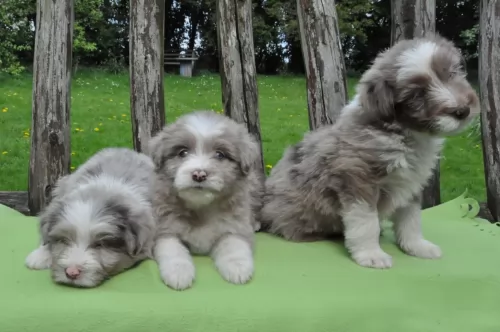 This breed is generally very healthy. They don’t have some major health issues. Some of the issues that are registered are:
This breed is generally very healthy. They don’t have some major health issues. Some of the issues that are registered are:
The degenerative disease that causes the blindness.
When the hormone produced by the thyroid gland is abnormally low.
That is generally the hereditary disease, can also be caused by bad diet or injuries.
To food, chemicals, pollen, dust...
That usually happens because of their dropped ears that are not very easy to clean.
 Whether feeding a pup, or an adult American Foxhound, you need to be sure the food is high quality and that you don’t overfeed. The Foxhound is happy to eat as much as you give him. They like to eat. Make sure you measure and don’t free feed. Control what they are eating.
Whether feeding a pup, or an adult American Foxhound, you need to be sure the food is high quality and that you don’t overfeed. The Foxhound is happy to eat as much as you give him. They like to eat. Make sure you measure and don’t free feed. Control what they are eating.
For a puppy feed twice, a day – 2 to 3 cups of high quality puppy food. When he becomes an adult feed him once a day with 2 cups of adult food.
As mentioned previously, the American English Foxhound, like most of the hound breeds is a very healthy dog. They do not have many genetic health issues. They do have a risk for thrombocytopathy. This risk is slight, but all owners of American English Foxhounds should be aware of it.
This disease is a circulatory system disease with poorly or non-functioning platelets. Platelets are designed to assist in the control of bleeding and without functioning ones the dog can bleed excessively from just a minor cut or bleed internally from a minor injury. The disease can be treated but you have to notice it first. Depending on how severe the disease is, the treatment will vary. Some dogs will have to be given platelets.
This is a high energy breed that is very active and needs a lot of exercise. They are not good for the first-time owner as they are stubborn and hard to train. They need room to run and get frustrated and out of sorts if they don’t have it. They can live in the suburbs but only with a large fenced yard, an even larger dog park and regular walks. This dog needs a lot of exercise. The simplest thing to do is take him hunting.
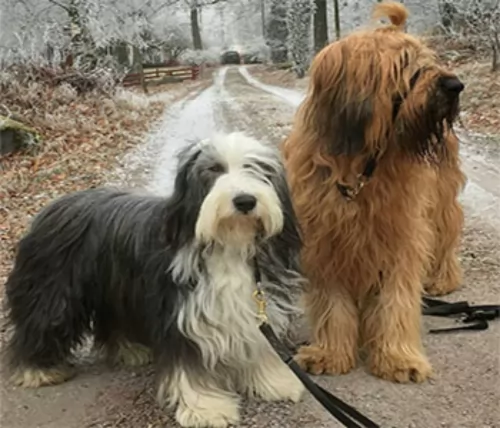 Raising your Bearded Collie pup on a high-quality food is usually enough for a puppy. Make sure that portions are appropriate for his age and weight. Once your pet is more than six months old, they will need only two meals per day. They get obese very easy. Don’t train them with the treats.
Raising your Bearded Collie pup on a high-quality food is usually enough for a puppy. Make sure that portions are appropriate for his age and weight. Once your pet is more than six months old, they will need only two meals per day. They get obese very easy. Don’t train them with the treats.
To care for your Bearded Collie, you must be aware of the grooming responsibilities that come with this longhaired pet. During the shedding period, it is required to brush them daily. Bathing is not a regular necessity but it will be easier to keep him clean and well groomed if you care about your pet all the time. Some people like to shorten the coat for their Beardie, and it is usually done during summer. Make sure to take him to regular ear, eye, teeth and hip vet checks.
The Bearded Collie is a breed that requires daily activity. They have very playful nature and they love to run, play and spend time outdoors. The best option will be a big yard so that Beardie can run for hours without the leash.